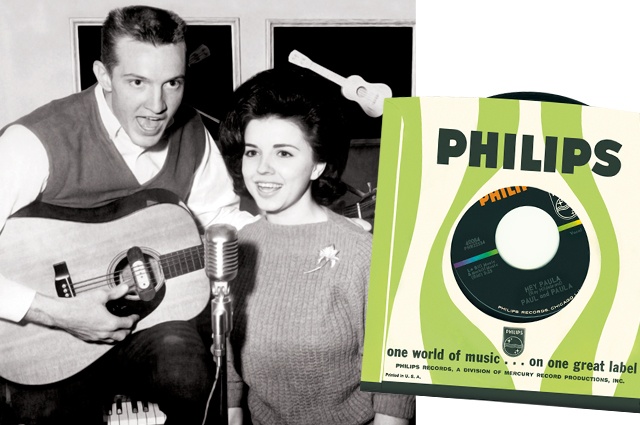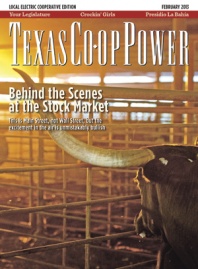Hey, hey Paula, I wanna marry you …
Hey, hey, hey, Paul, I want to marry you too …
In the fall of 1962, Howard Payne College students Jill Jackson and Ray Hildebrand were beginning to make a name for themselves in Brownwood. Jill, who was born in McCamey, had her own 15-minute Sunday afternoon radio show on KEAN. Ray sang with a group called the Prisoners. Jill and Ray met on campus. (By coincidence, he was boarding with her aunt.) They hit it off, and Jill invited Ray to become her duet partner.
Ray had begun singing in church at an early age and started writing songs in college. He was from Joshua and was attending Howard Payne on a basketball scholarship. One fateful day, a teammate asked Ray for a favor.
“Russell Berry asked me to write a song for his girlfriend,” Ray recalls. Her name was Paula. Writing a song on behalf of someone else proved difficult, and his first try didn’t work, so Ray started over. He’d broken up with his girlfriend, Judy Hendricks, and when he started composing again, his feelings for her poured out. Winston Hughes, another teammate, heard Ray’s work in progress and offered some crucial advice.
“He said, ‘Why don’t you have the girl sing back to the guy?’ ” Ray says. But what guy’s name should he use? Ray remembered a song he’d heard many times that summer—“Tall Paul” by Annette Funicello, which reached No. 7 on the Billboard Hot 100. Paul and Paula? It worked.
After Jill and Ray performed the song on the KEAN radio show, the station’s phones lit up. That prompted Jill’s mother to begin searching for a record producer. She contacted Marvin Montgomery, a session guitarist in Fort Worth. He worked with Major Bill Smith, who produced “Hey Baby,” the Bruce Channel hit that topped the Billboard Hot 100 for three weeks in March 1962. Montgomery mentioned an upcoming recording session but couldn’t guarantee that they would get an audition.
On October 6, 1962, Jill, Ray and Jill’s parents drove to Fort Worth. They arrived at the studio, in the basement of radio station KFJZ, and settled down to wait. Luck smiled on them when the final artist booked didn’t show up, and Smith gave the young duo a chance. After some tinkering with the song, they were ready. At just 5 feet 1 inch, Jill had to stand on some Coke crates to reach the microphone. After several run-throughs, they sang the final take.
“Paul and Paula” was released on Smith’s LeCam label. Later, Mercury Records acquired the rights to the single and Jill and Ray’s recording contract. Mercury reissued the record—now called “Hey, Paula”—on its Philips label. The single took off, holding the No. 1 position on Billboard’s Hot 100 chart for three weeks in February 1963.
“They changed our names. We called the song ‘Paul and Paula’ by Jill and Ray. They called it ‘Hey, Paula’ by Paul and Paula,” Ray remembers. They were told to act like they were sweethearts to help sell the record (which just happened to be No. 1 on Valentine’s Day).
They became celebrities, touring the world and making more money than they’d ever dreamed of. Paul and Paula appeared on “American Bandstand” and “To Tell the Truth.” In 1963, they joined the Dick Clark Caravan of Stars, a collection of popular young singers who toured the country by bus. (Funicello was part of the Dick Clark Caravan of Stars in 1959.) Recording sessions in Nashville and foreign tours were fitted into their hectic schedule.
In London, they were booked on a BBC radio/TV program called “Pop Inn.” The show ran long, and Paul and Paula closed the show, bumping a rising young British group—the Beatles. John, Paul, George and Ringo asked Jill and Ray for autographs, and they all posed for a photo.
Paul and Paula were an overnight sensation, leaving them little time to adjust. Ray was homesick and pined for his former girlfriend. In June 1963, he left the Caravan of Stars tour and headed home. For the remainder of the tour, Dick Clark filled in for Ray. Paul and Paula recorded two albums, plus a Christmas album, and toured Japan, but the end was in sight.
Ray returned to Howard Payne to continue his education, and he reunited with Judy Hendricks. They married in February 1964. Later, they moved to the Kansas City area, where Ray helped pioneer the contemporary Christian music genre. He still receives royalties for “Hey, Paula.” Jill moved to California, married Marvin Landon and continued her music career as a solo artist.
Jill and Ray have remained friends over the past 50 years and occasionally perform together. And every once in a while they are reminded of the staying power of their one big hit.
“Sometime in 2005, at an oldies gig held at a Fort Worth country club, the band took a break, and we went to the autograph table,” Ray says. “Many people lined up except for one couple who stood off to the side. They waited so they could be last in line. Finally, they stood in front of us and the woman, through her tears, told us what our little song meant to her in 1963. She was from a broken home—not much love—and her life was ripped apart, except when she was alone in her room and ‘Hey, Paula’ came on the radio. It was a song about love, staying together, planning together and wishing together. Needless to say, we all cried and hugged and thanked God.”
Our love will always be real
My love, my love.
——————–
Lori Grossman is a Dallas writer.
3 Weeks Atop the Hot 100
The top 10 in Billboard magazine’s Hot 100
Week of February 9, 1963
- ‘Hey Paula’: Paul and Paula
- ‘Walk Right In’: The Rooftop Singers
- ‘The Night Has A Thousand Eyes’: Bobby Vee
- ‘Loop De Loop’: Johnny Thunder
- ‘Up On The Roof’: The Drifters
- ‘Walk Like A Man’: The 4 Seasons
- ‘Ruby Baby’: Dion
- ‘You’ve Really Got A Hold On Me’: The Miracles
- ‘Rhythm Of The Rain’: The Cascades
- ‘Go Away Little Girl’: Steve Lawrence
Week of February 16, 1963
- ‘Hey Paula’: Paul and Paula
- ‘Walk Right In’: The Rooftop Singers
- ‘Walk Like A Man’: The 4 Seasons
- ‘Ruby Baby’: Dion
- ‘Rhythm Of The Rain’: The Cascades
- ‘From A Jack To A King’: Ned Miller
- ‘The Night Has A Thousand Eyes’: Bobby Vee
- ‘You’ve Really Got A Hold On Me’: The Miracles
- ‘Loop De Loop’: Johnny Thunder
- ‘Up On The Roof’: The Drifters
Week of February 23, 1963
- ‘Hey Paula’: Paul and Paula
- ‘Ruby Baby’: Dion
- ‘Walk Like A Man’: The 4 Seasons
- ‘Walk Right In’: The Rooftop Singers
- ‘Rhythm Of The Rain’: The Cascades
- ‘From A Jack To A King’: Ned Miller
- ‘You’re The Reason I’m Living’: Bobby Darin
- ‘Blame It On The Bossa Nova’: Eydie Gorme
- ‘You’ve Really Got A Hold On Me’: The Miracles
- ‘Wild Weekend’: The Rebels


